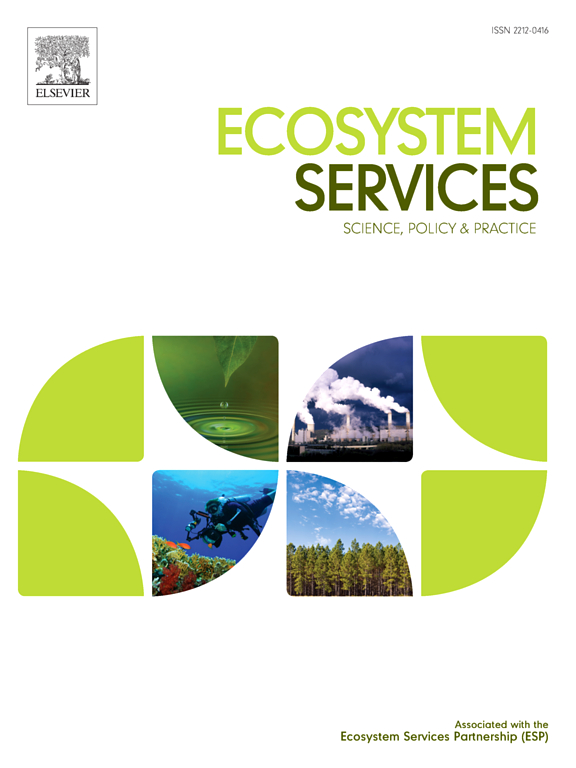建立统一的生态系统服务监测本体
IF 6.6
2区 环境科学与生态学
Q1 ECOLOGY
引用次数: 0
摘要
生态系统服务(ES)是全球和国家环境政策的重要组成部分。在此背景下,人们呼吁对生态系统服务进行监测,以支持其管理。然而,生态系统服务科学术语的泛滥阻碍了标准化监测的实现。监测生态系统需要准确了解要测量的变量,以及这些变量与生态系统状态变化的关系。此外,还需要信息系统所使用的方法之间具有互操作性,以实现数据流的可操作性。在此,我们旨在通过开发 ES 监测本体论,将 ES 的定义语言及其监测术语系统化。本体论是一种工具,可将概念和用于定义概念的术语之间的关系操作化。本体论允许人们和机器一致地使用术语。以其他学科的进展为基础,ES 监测本体将主要概念框架中的 ES 语言系统化,提高了 ES 概念的清晰度和可操作性。我们利用加拿大不列颠哥伦比亚省三个 ES 的数据对 ES 监测本体论进行了测试,以强调本体论如何能够实现信息共享和监测。我们表明,本体可以系统地组织和检索 ES 监测信息和数据。我们的工作有助于推进生态系统服务的互操作性,为利用自动化工具系统地了解生态系统服务的变化迈出了一步。我们邀请生态系统服务社区的成员加入到开发生态系统服务本体论的工作中来,以便本体论能够为系统监测社会生态系统变化的挑战做出贡献。本文章由计算机程序翻译,如有差异,请以英文原文为准。
Towards a unified ontology for monitoring ecosystem services
Ecosystem services (ES) are an important part of global and national environmental policies. In this context, there is a call for the monitoring of ES to support their management. However, the proliferation of terms used within ES science is a barrier to standardised monitoring. Monitoring ES requires knowing exactly what variables to measure and how they relate to change in the states of ES. It further requires interoperability between methodologies used by information systems to operationalise data flows. Here, we aim to systematise the language used to define ES and the terminology used in their monitoring by developing an ontology for ES monitoring. Ontologies are tools that operationalise concepts and the relationships among terms used to define them. An ontology allows people and machines to use terms consistently. Building on advances in other disciplines, the ES monitoring ontology systematises the language of ES across major conceptual frameworks advancing conceptual clarity and operationalisation of ES. We test the ES monitoring ontology with data from three ES in British Columbia, Canada, to highlight how it can enable information sharing and monitoring. We show that the ontology can organise and retrieve information and data for ES monitoring in a systematic way. Our work contributes to advancing interoperability of ES, taking a step towards systematically understanding ES change with automated tools. We invite members of the ES community to join the effort of developing this ontology for ES so that can it contribute to the challenge of systematically monitoring change in social-ecological systems.
求助全文
通过发布文献求助,成功后即可免费获取论文全文。
去求助
来源期刊

Ecosystem Services
ECOLOGYENVIRONMENTAL SCIENCES&-ENVIRONMENTAL SCIENCES
CiteScore
14.90
自引率
7.90%
发文量
109
期刊介绍:
Ecosystem Services is an international, interdisciplinary journal that is associated with the Ecosystem Services Partnership (ESP). The journal is dedicated to exploring the science, policy, and practice related to ecosystem services, which are the various ways in which ecosystems contribute to human well-being, both directly and indirectly.
Ecosystem Services contributes to the broader goal of ensuring that the benefits of ecosystems are recognized, valued, and sustainably managed for the well-being of current and future generations. The journal serves as a platform for scholars, practitioners, policymakers, and other stakeholders to share their findings and insights, fostering collaboration and innovation in the field of ecosystem services.
 求助内容:
求助内容: 应助结果提醒方式:
应助结果提醒方式:


